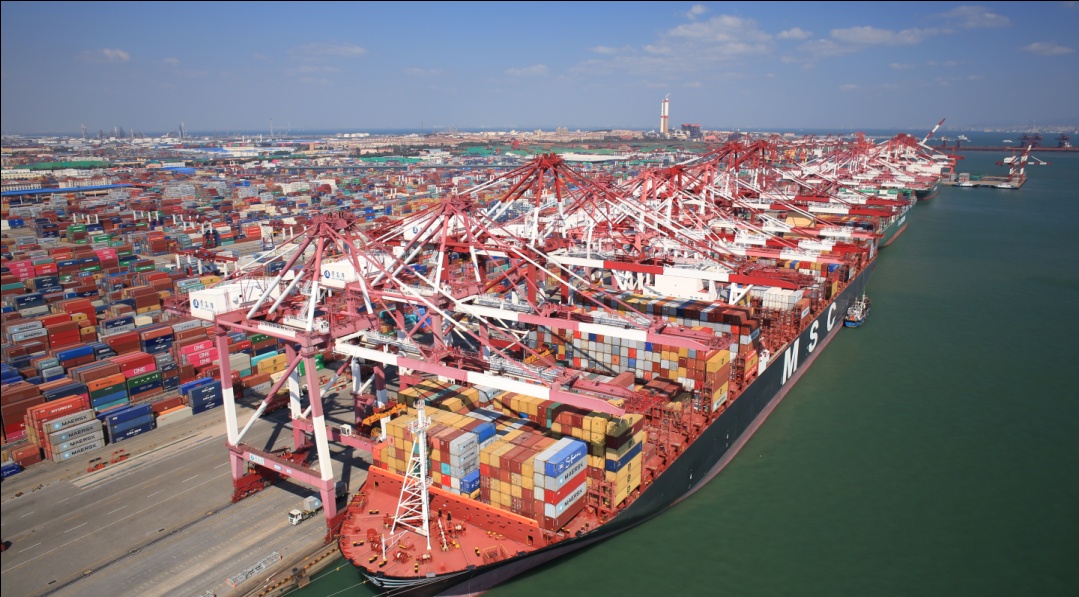
Reform and opening up: China’s development benefits the world

In 1978, China adopted the policy of reform and opening up. From rural to urban areas, from pilot programs to wide promotion, and from economic system reform to comprehensively deepening reforms, the policy has not only promoted China to achieve a miracle of economic and social progress, but also injected powerful impetus into the global development. From 1978 to 2017, China’s GDP grew 33.5 fold to $12.3 trillion, with an average annual growth rate of 9.5 percent. The global share of China’s GDP also rose to 15.3 from 1.8 percent in the same period.
China has been the world’s second largest economy since 2010. During the past 4 decades, its total foreign trade grew 198 times, and foreign trade of services 147 times. It also attracted over $2 trillion of foreign investment. The Port of Qingdao is the second foreign trade port of China that has an annual cargo handling capacity exceeding 100 million tons. Last year, the port handled a total of 510 million tons of goods, 26 times of that in 1978. It plays an important role in promoting an open economy. The past 40 years have been a time for Chinese rural and urban residents to witness the fastest growth of their incomes, and a boom in welfare. China’s per capita disposable income hit 25,974 yuan in 2017, growing 22.8 times from 1978 if accounting for inflation, with an average annual growth of 8.5 percent.
The past several decades have also witnessed a miracle of poverty reduction in human history – over 700 million Chinese people were lifted out of poverty. The “Double Eleven” shopping spree has gradually turned from a plain promotion activity in 2009 into the world’s largest shopping festival. A total of 180,000 brands from home and abroad were involved in this consumption feast this year. T-Mall (e-commerce platform of Alibaba) alone, has created a daily turnover of 213.5 billion. All these facts prove that, as China’s economy develops, the country’s urban and rural residents are enjoying increasingly improved consumption power and livelihood. China adopts an opening-up strategy that features win-win cooperation. It has taken full advantage of the world’s opportunities, while creating opportunities for the world.
In recent years, China has kept a 30-percent-plus contribution to the world economic growth, serving as an important engine that drives global economic recovery. As China’s “circle of friends” in trade expands larger and larger, the country’s trading partner now adds up to over 230 from only around 40 four decades ago. Since 2010, China has maintained itself as the world’s second largest importer, the largest importer of e-commerce goods, and the biggest contributor to global growth of services. Facing an imbalanced world economy, China proposed to jointly build the Belt and Road Initiative (BRI). In the past five years, the country has signed BRI cooperation agreements with more than 140 countries and international organizations, and a batch of major cooperative projects have been implemented. Now the Belt and Road countries and regions cover over 60 percent of the global population and more than 1/3 of world trade. By June this year, merchandise trade between China and countries along the route has exceeded $5 trillion. China’s total investment in economic and trade cooperation zones in these countries amounted to $28.9 billion, creating $2.01 billion of tax revenues and providing 244,000 local jobs.
China’s opening up has efficiently promoted global peace, stability, development and prosperity. As a major power driving the South-South Cooperation, China is the largest investor in over 40 of the world’s least developed countries. China’s peacekeepers are a major force in the UN peacekeeping missions, and its doctors are also healing the wounded and saving the dying in Africa and the Middle East. More and more Chinese are going overseas to fulfill China’s responsibility through concrete actions. As certain countries are practicing trade protectionism at present, some people wonder if China will also follow up and build trade barriers. In this regard, Chinese President Xi Jinping has reiterated that China’s door will never be closed. It will only open still wider. China will not stop its effort to pursue higher-quality inclusiveness. China will not stop its effort to pursue an open world economy. And China will not stop its effort to pursue a community with a shared future for mankind. At the opening ceremony of the first China International Import Expo, the Chinese president proposed a series of major measures to open up further. When trade protectionism picks up, these measures are the most powerful counterstrikes and the strongest support to economic globalization.
(People’s Daily)


